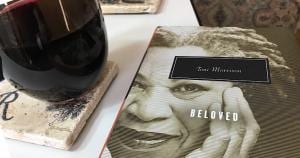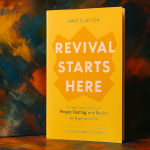 People trained to know tell me Beloved by Toni Morrison is a classic. When creating a “must read” canon of Twentieth Century literature in English, the book makes the cut (and such choices are hard) in department after department.
People trained to know tell me Beloved by Toni Morrison is a classic. When creating a “must read” canon of Twentieth Century literature in English, the book makes the cut (and such choices are hard) in department after department.
I will not question that judgment here.
First, the book is beautifully written. Take just this one sentence: “Not quite in a hurry, but losing no time, Sethe and Paul D climbed the white stairs.” I enjoyed copying the sentence, admiring the form, how the three parts balance. Color, in this case ‘white,” is important in the text, and here suggested to me the direction or decision may be wrong. The feeling described (“not quite in a hurry, but losing no time”) is captured in words: just so.
Second, this a powerful woman’s voice about women as the central figures in a story. My understanding, perspective is widened by the text.
The emotions are genuine. Painful paragraphs, and there are many of those, are painful. I cannot read the book quickly, though it is written in clear prose, because the text is profound: spiritually rich, even where I do not trust the spirit invoked.
The commentary on the book is vast, my appreciation sincere.
And yet.
As I read this week, I was in an odd situation of having saturated myself in the narratives of enslaved people finding freedom.
Morrison is not too graphic, not at all. Slavery was hell. Here is Amy Chapman, enslaved, then free:
He was de meanes’ oberseer us ever had. He tuk my ol’est brother an’ had him stretched out jus’ lak you see Christ on de cross; had him chained, an’ I sot down on de groun’ by him an’ cried all night lack Mary an’ dem done. Dat oberseer was de fus’ one dat ever putt me in de fiel’, an’ he whupped me wid de cat er nine tails when I was stark naked.
The voice of Beloved is strong, the invocation of power mighty, but did not feel authentic. Surely the book is the authentic voice of Toni Morrison, but the characters act and live as if they were less Victorian era African-Americans, than late 1980’s Toni Morrison. There is (of course!) nothing wrong with rewriting history to be as the author wishes it had been, maybe should have been, but danger as well.
Where is the pervasive Christian faith of the overwhelming majority of these narratives?
Where is the Bible?
Where is the recurring theme in the words of freed people looking back mostly saying those days were hell, but modernity is no bargain?
Beloved strikes me as an appropriation of a narrative style to make a different point than the people who created the narrative style. Again; this can be good and in the hands of a world class writer like Morrison brilliant. However, many people I read on the book assume this is “the way it was.”
Beloved is obviously not history, but feels a bit like history hi-jacked or more charitably made better, more sanitary, for our sensibilities. It is hard to learn that way.
More people read Beloved than the invaluable testimony of actual freed men and women looking back on the hellish days of slavery. Of course, too few people read Beloved. Too few people read African-American authors. Too few people read womanist books. Too few people read good books. Too few people read.
Given all of that, there is danger when a generation is appropriated who would, overwhelmingly, not like the service into which their narrative is pressed. Of course, all the narratives we have are (themselves) filtered through assumptions and a degree of performance on the part of the teller.
Still I miss the voice of Ank Bishop:
“But I’m a believer, an’ dis here voodoo an’ hoodoo an’ sper’ts ain’t nothin’ but a lot of folk’s outten Christ. Ha’nts ain’t nothin’ but somebody died outten Christ an’ his sper’t ain’t at res’, jes’ in a wand’rin’ condition in de world. ”
Dis is de evil sper’t what de Bible tells about when hit say a person has got two sper’ts, a good one an’ a evil one. De good sper’t goes to a place of happiness an’ rest, an’ you doan’ see hit no mo’, but de evil sper’t ain’t got no place to go. Hit’s dwellin’ place done tore down when de body died, an’ hit’s jes’ a wand’rin’ an a waitin’ for Gabr’el to blow his trump, den de worl’ gwineter come to an en’. But when God say, ‘Take down de silver mouf trump an’ blow, Gabr’el,’ an’ Gabr’el say, ‘Lord, how loud shell I blow?’ Den de Lord say, ‘Blow easy, Gabr’el, en ca’m, not to ‘larm my lilies.’ De secon’ time Gabr’el say, ‘How loud mus’ I blow, Lord?’ Den de Lord say, ‘Blow hit as loud as seben claps of thunder all added into one echo, so as to wake up dem damnable sper’ts sleepin’ in de grave-ya’ds what ain’t never made no peace wid dey God, jes’ alayin’ dere in dey sins.’ ”
But de Christ’en Army, hit gits up wid de fus’ trump, an’ dem what is deef is de evil ones what anybody kin see anytime. I ain’t skeered of ’em, though. I passes ’em an’ goes right on plowin’, but iffen you wants ’em to git outten your way, all you gotter do is jes’ turn your head least bit an’ look back. Dey gone jes’ lack dat! When my fus’ wife died ’bout thirty years ago, I was goin’ up to Gaston to see Sara Drayden, ole Scot Drayden’s wife, an’ I tuck out through Kennedy bottom ’bout sundown right after a rain. I seed sompin acomin’ down de road ’bout dat high, ’bout size a little black shaggy dog, an’ I says, ‘What’s dat I sees commin’ down de road? Ain’t nobody ‘roun’ here got no black shaggy dog? Hit kep’ a-comin’ an’ kep’ a-gittin’ bigger an’ bigger an’ closer an’ closer, an’ time hit got right to me ’twas as big as a ha’f growed yearlin’, black as a crow. It had four feet an’ drop years, jes’ lack a dog, but ‘twa’n’t no dog, I knows dat. Den he shy out in de bushes, an’ he come right back in de road, an’ hit went on de way I was comin’ from, so I went on de way hit was comin’ from. I ain’t never seed dat thing no mo’. But I’ze gotter pretty good notion ’bout who hit ’twas.”
That is the voice of the beloved of God. I missed it in Beloved. Too often it reads as if she is cleaning Ank Bishop up and making him the way she wished he was. But that is a quibble: Toni Morrison is a voice worth hearting and her mythologized history is fascinating.
Read the book, but read the narratives too.
—————————————
Read the narrative of Laura Clark after the novel and wonder:
CHILLUN IN EV’Y GRABEYARD
Laura Clark, black and wrinkled with her eighty-six years, moved limpingly about the tiny porch of her cabin on the outskirts of Livingston. Battered cans and rickety boxes were filled with a profusion of flowers of the common variety. Laura offered me a split-bottomed chair and lowered herself slowly into a rocker that creaked even under her frail body.
“Po’ly, Miss, po’ly,” she responded to my query about her health. “Tain’t lack de old days. I’s crippled and mos’ blin’ now atter all de years what I got.
“I was born on Mr. Pleasant Powell’s place in North Ca’lina, and when I was ’bout six or seven years ole I reckon hit ’twas, Mr. Garret from right up yonder in de bend, ’bout eight miles from Livingston gwine no’th on de Livingston and Epes road, bought ten of us chillun in North Ca’lina and sont two white men, and one was Mr. Skinner, to fotch us back in waggins. En he fotch ole Julie Powell and Henry to look atter us. Wa’n’t none of dem ten chillun no kin to me, and he never bought my mammy, so I had to leave her behine.
“I recollect Mammy said to old Julie, ‘Take keer my baby chile (dat was me) an iffen I never sees her no mo’ raise her for God.’ Den she fell off de waggin where us was all settin’ and roll over on de groun’ jes’ acryin’. But us was eatin’ candy what dey done give us for to keep us quiet, and I didn’t have sense ’nuff for to know what ailed Mammy, but I knows now and I never seed her no mo’ in dis life. When I heered from her atter S’render she done dead and buried. Her name was Rachel Powell. My pappy’s name I don’t know ca’se he done been sole to somewhars else when I was too little to recollect. But my mammy was de mother of twenty-two chillun and she had twins in her lap when us driv’ off. My gran’mammy said when I lef’, ‘Pray, Laura, and be er good gal, and min’ bofe white and black. Ev’body will lack you and iffen you never see me no mo’ pray to meet me in heaven.’ Den she cried. Her name was Rose Powell.
“Us all started den for Mr. Garrett’s plantation down yonder in de bend, ten chillun and two ole uns, and two white men, and us was travellin’ solid a month. Fuss thing Ole Marsa say was ‘Now be good ter dese motherless chillun.’ Den he went to war, and de overseers forgot all ’bout dey promise. When Ole Marsa come back he done got his arm shot off, but he let bofe dem overseers go, ca’se dey done whupped dat ole ‘oman what come wid us to deaf. She brought her two little boys, Colvin and ‘Lias, but Joe, dey pappy, didn’t come —he was sole ‘fo ‘Lias was bawn. Joe never seed ‘Lias. Laura Clark, Livingston, Alabama
“I sets cross de road here from dat church over yonder and can’t go ‘ca’se I’m cripple’ and blin’, but I heers um singin’: A motherless chile sees a hard time Oh, Lord, he’p her on de road. ‘Er sister will do de bes’ she kin Dis is a hard world, Lord, fer a motherless chile.
“And I jes’ busts out cryin’. Dat was de song I had in view to sing for you, hit’s so mournful. I knowed ‘twa’n’t no reel, ‘twa’n’t nothin’ lack no reel, ‘ca’se I been b’longin’ to de church for fifty-five years, and I don’t fancy no reel. I’m glad I got hit to my min’ ‘fo’ you lef’. But my recollection is shaller. I ain’t never read no verse in no Bible in my life, ca’se I can’t read. Some my chillun kin, though. My husban’ died and lef’ me wid nine chillun, none of um couldn’t pull de others outer de fire iffen dey fell in. I had mo’n dat, but some come here dead and some didn’t. I got chillun dead in Birmingham and Bessemer. Dey ain’t a graveyard in dis here settlement ‘roun’ Prospect where I ain’t got chillun buried. Hettie Ann, right up dere ter Mr. Hawkins’ graveyard, and my boy whut got killed settin’ on de side de road eatin’ his dinner, he’ buried in Captain Jones’ place in de bend yonder. “Yassum, I been drug about and put through de shackles so bad I done forgot some of dey names, and I mos’ blin’ now and can’t hear good neither. But my eyes is good nuff for to see ghosts, but I don’t b’lieve in ’em, ‘ca’se I’d see dem chillun sometime effen dey was ghosties. I know I’d see my boy, ca’se dey showed me his head whar dat Miller boy hit him in de head wid a spade and split his head wide open, slip up behin’ him and all he said was ‘Squeek,’ jes’ lack a hog, and he was dead. And de murderer live right here but dey move and now I’m here. When hit rain us jes’ gets under de bed ‘ca’se de house ain’t got no top on hit. Laura Clark’s House, Livingston, Alabama
“I can’t say Marse Garrett wa’n’t good to us motherless chillun but de overseer, Mr. Woodson Tucker, was mean as anybody. He’d whup you nigh ’bout to deaf, and had a whuppin’ log what he strip ’em buck naked and lay ’em on de log. He whup ’em wid a wide strop, wider’n my han’, den he pop de blisters what he raise and ‘nint ’em wid red pepper, salt, and vinegar. Den he put ’em in de house dey call de pest house and have a ‘oman stay dere to keep de flys offen ’em ‘twell dey get able to move. Den dey had reg’lar men in de fields wid spades, and iffen you didn’t do what you git tole, de overseer would wrop dat strap ‘roun’ his han’ and hit you in de haid wid de wooden handle ’til he kilt you. Den de mens would dig a hole wid de spades and throw ’em in hit right dere in de fiel’ jes’ lack dey was cows —didn’t have no funeral nor nothin’.
“Us had a heap of houses in de quarters right on bofe sides de Big House. Us could step outer one house to ‘tother. But, Miss, I didn’t work so hard or have no trouble either. I was in de house atter Marsa come home and foun’ me splittin’ rails and plowin’. He ‘lowed dey done put me in too hard a ship, and I was too little, so he tuck me to de house to draw water and wash dishes, ‘ca’se I was a little motherless gal. Ole Marsa done a good part by me, and I was married to my fuss husban’, Cary Crockett, right dere in de parlor. He tole de overseer dat us was human and had feelin’s same as him, so he rejected de paterrollers and made ’em git off de place. I was treated good, ‘ca’se I ‘membered what my gran’ma say, and whatever dey tole me to put my han’ to, I did, and I was obedient and wasn’t hardheaded lack some de res.’ I had no trouble, and wasn’t ‘buked none. But I’s had mo’ trouble las’ ten years wid my own chillun den I ever did in slav’y time. Dey gives me sich bitter words till I can’t swaller ’em and I jes’ sets and cries. I can’t read no songs to comfort me, jes’ ketch ’em from de preacher on de stan’ and hole ’em, dat’s de way I ketch my larnin’.
“Las’ sermon I hyard, he tuck his tex’ en said, ‘Don’t nobody rob God.’ Den he say, ‘Effen you is goin’ to ‘tend to serve God, serve Him in de full, ‘ca’se God don’t never bat a eye, nor turn His haid and he kin see you. He frowns at ev’y sin, but He’s a sinforgivin’ man.’ I use to know a heap ’bout de Lord, but I’m so cripple’ an blin’ since de ca’f jumped on my foot I can’t go to church no mo’, so I done forgot.
“You ax ’bout dem flowers on de po’ch —I sho’ wish dey was mine, you could have ’em ‘ca’se dey ain’t room nuff wid dem for me ter sit whar I desire. Us ain’t got no meal and here ’tis jes’ Tuesday —no mo’ till Saddy. Sho’ is bad; us jes’ ‘pends on de neighbors and borrys.”














